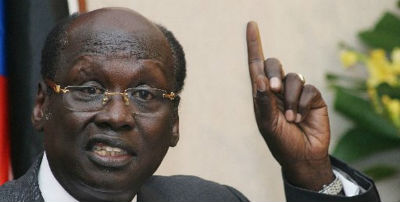Juba, March 22, 2016 (SSNA) — South Sudan’s Foreign Minister, Dr. Barnaba Marial Benjamin, said his government will no longer pay accommodation fees of members of rebel advance team who were sent to Juba late last year to start the implementation process of the IGAD-Plus brokered power-sharing deal.
Pagak has recently accused Juba of using ‘delaying tactics’ to impede the implementation of the peace agreement.
“The people responsible for their accommodation when they were coming in was the troika, and they were paying for them at the hotel. But troika suddenly stopped and said they were no long going to pay for them,” Marial was quotes by the VOA as saying.
“So the government volunteered to pay for them for some time. The government has been paying for them for the last two months,” he complained.
Marial, who has been branded by anti-government elements as “Kiir’s number one doll,” accused Troika nations of refusing to pay fees of the rebel advance team and complained that Kiir’s government believes that rebel leader Dr. Riek Machar is supposed to be in Juba by now to form an interim-government.
However, the government claim is not consistent with what the Troika actually said early this year when it terminated its financial support to the rebel advance tram.
The South Sudan News Agency (SSNA) has learned that the decision that was made by the Troika to help pay bills of members of the rebel advance team was communicated to all parties to the conflict.
In a Troika’s memo, a copy of which was obtained by the SSNA, the three nations block made it clear in the document that their financial support will end on the 22nd of January 2016—a dateline which was originally set by the IGAD-Plus to form a transitional government of national unity.
In that January document, Troika also disclosed that it has informed both the leaderships of both the armed opposition and South Sudanese government that its financial support was only suited for a one-time payment and that its financial commitment will end on January 22, 2016, if parties to the conflict failed to form a transitional government.

